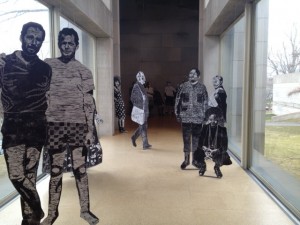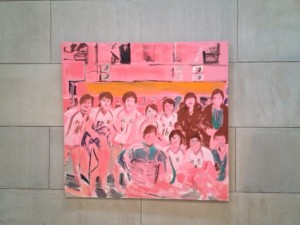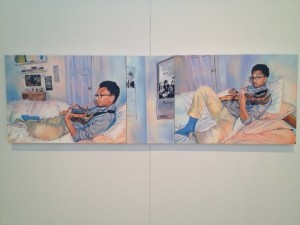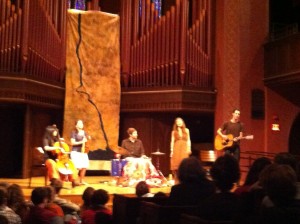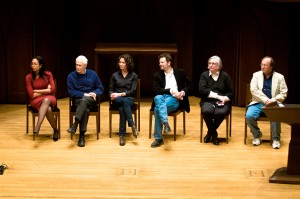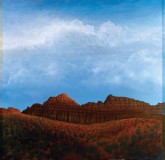It’s that time of year again…lots of Wesleyans are on the road for spring break but many seniors are busy all across campus getting their honors theses into shape to meet those April deadlines. Tina Jung, for example, is working on issues of history and memory for her thesis. Her work is based, in part, on oral interviews. Katherine Malczewski is focused on Ida, A [Performative] Novel and the Construction of (Id)entity. Katherine delves into Getrude Stein’s definitions of identity versus entity through an analysis of the novel, the writer’s personal letters, and lectures.
Colin O’Connor is working on philosophical and literary constraints on anarchist literary production in contemporary Germany. Siri Carr is working in her COL thesis on concepts of “the little” in children’s literature. Sarah Esocoff‘s COL thesis is doing a painting thesis called “Strangers,” while Dexter Blumenthal is writing on food practices in contemporary Paris.
Paul McCallion’s thesis in Science in Society is called “Doctors Without Answers: Limits, Challenges, and Dilemmas of Humanitarian (Bio)medicine, and Doctors Without Borders” while Adin Vaewsorn’s work is entitled “Towards a Holistic Understanding of Obesity and Anti-Obesity Interventions Among African-American Women.” Both are going beyond biomedical models to look at larger social and economic forces.
In English, Ronnie Alvarado is writing a scholarly thesis on the influence of liberal and neoliberal theories of childhood and education on children’s fantasy literature during two golden ages of the genre — working title: “Fantasies of Education.”
Dandara Catete is doing a sculpture thesis exhibition entitled “Amorfo” consisting of several sculptures, each of which partially joins two full-scale mattresses to suggest the ambiguities of merging yet maintaining distinct identities in a romantic relationship.
David Stouck’s thesis, provisionally entitled “Cultural Osmosis in the Modern Chinese Music Industry, is based on his writing and recording of a series of Chinese rap/hip-hop songs. The College of East Asian Studies folks tell me he’s getting help with the research from several Wes students.
I’ve just touched the tip of the thesis iceberg…getting information from deans and colleagues. If you’d like me to include others, just email or comment on this blog post.
UPDATE:
These recently came in from Neuroscience and Behavior:
Matan Koplin–Green is working on how EEG’s might be used to help train those seeking to reduce anxiety. Neha Shafique is aiming at a “Quantitative Description of Heterogeneous Lipid Membrane Dynamics.” Ellen Lesser is working on “Diet and Motivation: effects of prenatal and lifetime exposure to junk food,” while Simone Hyman compares stigma and schizophrenia in Gujarat, India and Middletown, CT. Sam Rispaud also works on schizophrenia, asking how neurocognitive function relates to changes in functional outcome.
UPDATE: And these from Astronomy:
Sam Factor took his first astronomy class in the fall of his senior year, and graduated last spring with majors in physics and computer science. This year he graduates with an MA in astronomy and an impressive thesis that includes an analysis of planet-forming potential in an environment similar to where the Sun is thought to have formed. Sam’s experience at the intersection of physics, computer science, and astronomy has made him a very effective researcher and, after only one year as an astronomer, his thesis marks a significant contribution to the field of planet formation research.
Jesse Lieman-Sifry has been working since his junior year on understanding the last gasps of gas giant planet formation. Jesse has done beautiful work on not one but two separate projects with the newly-operational ALMA telescope in Chile, the most powerful and versatile radio telescope ever built, and has been a guest observer at the Submillimeter Array in Hawaii.
Dilovan Serindag is using observations from the Kepler Space Telescope to characterize the atmospheres of planets around other stars. He developed and coded his own modeling algorithm to measure the phase changes as these planets orbit around their stars. These planets orbit in just a matter of days, and the analysis that Dilovan is doing can tell us the temperature of the planet and how reflective its atmosphere is.
FINAL UPDATE AS SPRING BREAK ENDS
Rachel Leicher is combining in vivo genetic approaches using budding yeast cells with in vitro DNA binding studies to gain a fuller picture of the functions of H’1, a basic structural component of our chromosomes. Veronica Birdsall is studying protein-DNA interactions to address questions of recognition and specificity in the case of an architectural DNA-binding protein, Integration Host Factor. Derek Frank is using spectrocopy studies to probe the structure of DOH-N2O, a weakly bound van der Waals complex. Rotational spectroscopy is shown as a powerful technique to investigate the structure of gas phase complexes and the chemistry of weakly bound systems. Erin Cohn is exploring degradation of lignin, a paper industry waste product, and the most abundant aromatic compound found in nature. The products of its degradation by enzymes could be utilized in the generation of biofuels.
Emma Kemler is working on a project examining how to define and measure citizenship within the context of higher education in Argentina and in Middletown. Alison Goldberg is writing a psychology thesis on anti-Semitism and the relationship between physical and personality stereotypes of Jewish individuals. Kate Weiner’s “Reciprocity: Community-Making at East New York Farms!” uses creative non-fiction and a variety of disciplines to explore how community is cultivated in the context of urban agriculture. Christian Hosam‘s African American Studies thesis is entitled “Linked Fate in Asian America: Promise, Pitfalls, and Practice.” Christian looks at the concept of linked fate, identifying the ways that the extant literature actually reinforces stereotypes of the “apolitical” Asian American because it assumes that linked fate is necessarily correlated with increased levels of political engagement. Kehan Zhou, writing in CSS and Economics, analyzes alternative currency movements, in particular crypto-currencies, and in particular Bitcoin, concentrating on the supply of and demand for cryptocurrencies, how cryptocurrencies work, and the operation of the markets for crypto-currencies including pricing fluctuations, security issues, and possibilities for arbitrage.
Grace Herman-Holland‘s directing thesis examines the relationship between performers and audiences during kabuki’s golden age, identifying elements of a highly engaged spectatorship with the potential to inform contemporary theatrical practices. The Wesleyan cover band Love Hotel furnished music for her production of “Skyfall,” which was performed in the ’92 Theater the weekend of February 26-28.
There are plenty more theses out there, and lots of recitals coming up as part of the work. The first senior thesis art exhibition opens at the Zilkha Gallery on Wednesday, March 25!





